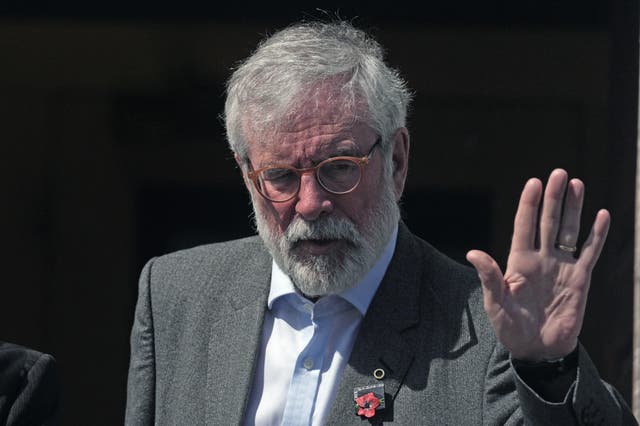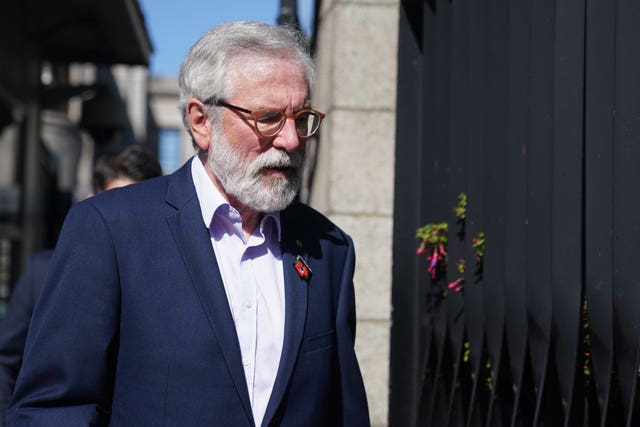Claim about Adams in BBC programme ‘probably’ not rules breach – media expert
A court was told that the programme was not ‘unfair or unjust’.

A BBC programme which aired a claim that Gerry Adams sanctioned the killing of a spy would “probably” not have breached broadcasting regulations and was not “unfair or unjust”, a media expert has told a court.
Chris Banatvala, who drew up the UK’s broadcasting rules for Ofcom and was its founding director of standards, compiled a report based on a programme which claimed that Mr Adams had sanctioned the murder of Denis Donaldson.
Mr Banatvala, who is an independent and media consultant, said that in his conclusion it is his view that the programme would “probably” not have been found to breach Ofcom’s broadcasting rules, and was not unfair or unjust.
Mr Adams has claimed that the BBC Spotlight programme, as well as an accompanying online story, defamed him by alleging he sanctioned the killing of Mr Donaldson.

He denies any involvement.
Mr Donaldson was shot dead in 2006, months after admitting he was a police and MI5 agent for 20 years.
In 2009, the Real IRA claimed responsibility for the killing, and the Spotlight programme was broadcast in September 2016 while a garda investigation into the matter was ongoing.
In the programme, an anonymous source identified as “Martin”, who says he was an informant for Special Branch within the IRA, claimed that the shooting was sanctioned by the political and military leadership of the IRA and that Mr Adams “gives the final say”.
The BBC has said the claim was corroborated by five other sources.
The High Court in Dublin heard that he was asked to assess and produce a report on the programme by solicitors for the BBC.
He said: “What I have written is, on balance, given the significant public interest, what information is already in the public domain about Gerry Adams, the fact that the BBC reasonably believed its primary source, “Martin”, to be credible and reliable, that the BBC had corroborative evidence from other credible and multiple sources.
“It was couched in terms of allegations, there was an appropriate and timely opportunity to respond, the programme would probably not be found in breach and not be unfair or unjust to Mr Adams.”
He said that Ofcom is not a fact-finding tribunal.
“It is not there to decide whether or not this allegation is true. What it is there to decide was whether making that claim was unfair to Mr Adams, given all the circumstances and the programme as broadcast,” he added.
He also said that the allegation was of high public interest.
“It’s of high public interest because it concerns a then elected politician, an allegation of serious misconduct, of potentially sanctioning a murder at a time when the IRA had a ceasefire, where the political progress had moved towards peace, and he was responsible, allegedly, for sanctioning the killing of an informant.
“You couldn’t get a more serious allegation or something of greater interest to the public.”
In his report, he stated that an allegation that an elected figure sanctioned the killing of an informant in the context of that political environment is of the highest public interest.
He also said the more serious an allegation is, the better the investigation should be.
Mr Banatvala added: “I understand that people have made allegations that he (Mr Adams) was on the IRA army council, and he’s always denied it.
“I also understand that he has an alleged paramilitary background, and he sanctioned murders. I also know that he’s vehemently denied that – that I’ve known for the last 10 or 20 years.
“That does not mean that you can make any allegation against any person. You’ve got to have the evidence, you’ve got to have your sources, but that is the background in which you have to make that particular judgment on that particular issue.
“I think the programme is quite clear that it explains that the programme is based on a number of sources, whether that is security forces, police forces, etc.
“With regard to the allegation against Mr Adams, post transmission correspondence is clear that the BBC claims to have multiple credible other sources. I think it would have been helpful for the audience to have understood that, it would have perhaps given greater veracity to the story.

“Having said that, I don’t believe that that within itself would cause unfairness to Mr Adams.
“Ironically, you could argue that, saying that there are more sources out there that agree with that claim, you could say that actually that does potentially more damage to potential unfairness to Mr Adams, because it only reinforces the allegation. So it works both ways.”
Mr Banatvala said it was also important to assess whether or not the BBC states as a matter of fact that Mr Adams sanctioned the murder, or whether it put it in the words of an allegation.
“Obviously, if they state it as fact, that means that it needs an awful lot of particular evidence that you can prove it. If you state it as an allegation, something that you have heard, you think is credible, you think it’s in the public interest to transmit, but you cannot guarantee that it’s true,” he added.
“If you take that in the round and the programme, and the fact there are sources, I think it’s very evident on this particular point that it was couched in the terms of allegation.”
Mr Banatvala also said that Mr Adams was given an “appropriate and timely” opportunity to respond to the allegations.
During cross-examination by Mr Adams’ barrister, Tom Hogan SC, Mr Banatvala said the BBC programme had not portrayed the material from its anonymous source as a “fact”, and rather as an “allegation”.
He said that was a subtle distinction.
Mr Hogan rejected that assertion, insisting that the documentary had presented the claim about Mr Adams sanctioning the murder as fact.
“I respectfully disagree,” replied the witness.
Mr Hogan then asked Mr Banatvala if it was unusual for a programme’s editor not to be involved in engagement with Ofcom when it was investigating a complaint.
The barrister noted that Spotlight’s then editor Jeremy Adams was not listed as a witness in the High Court case.
Mr Banatvala replied: “I believe he’s no longer at the BBC.”
The trial continues.





